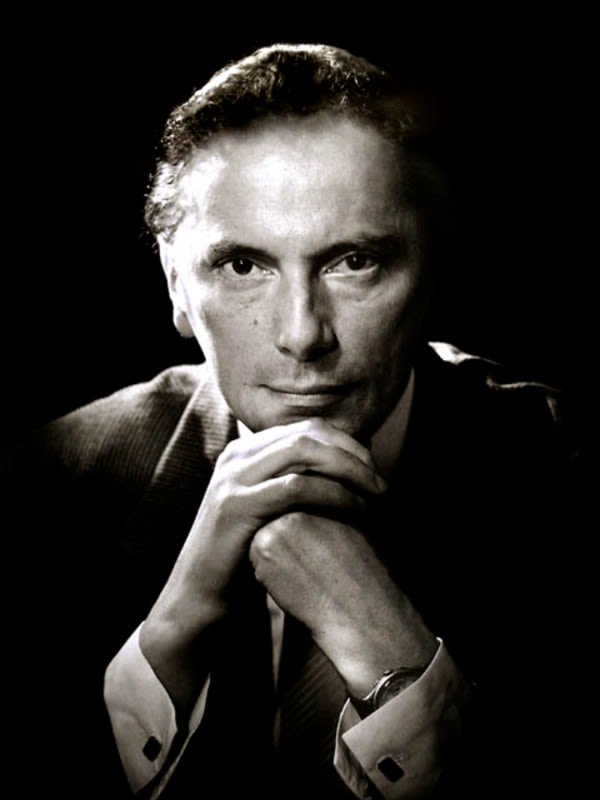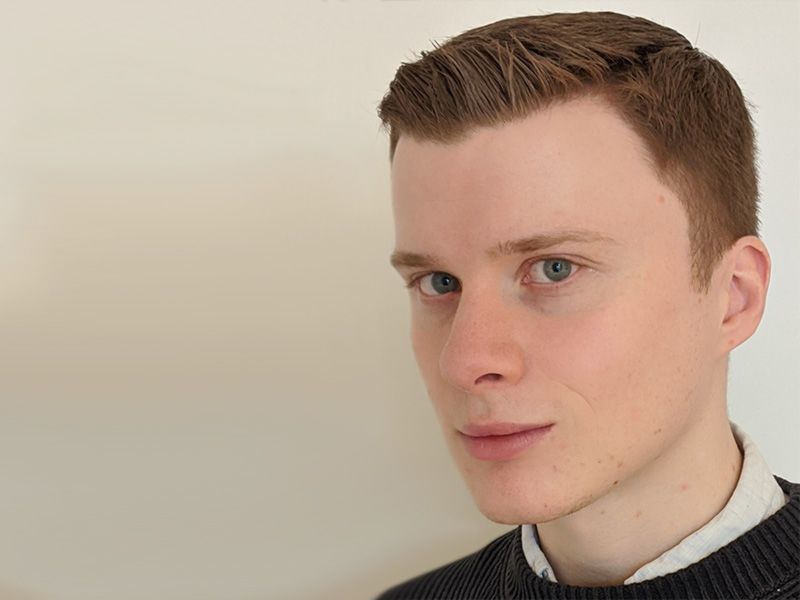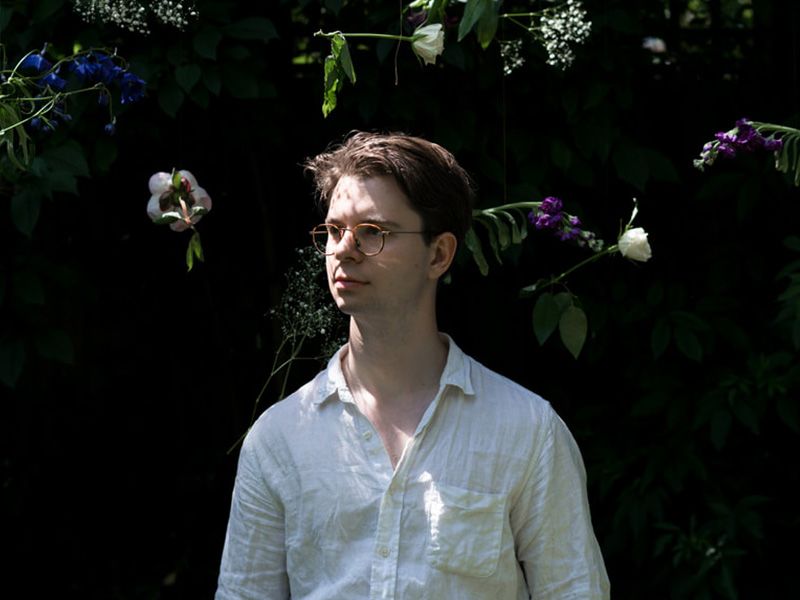LSO Panufnik
Composers
About the scheme
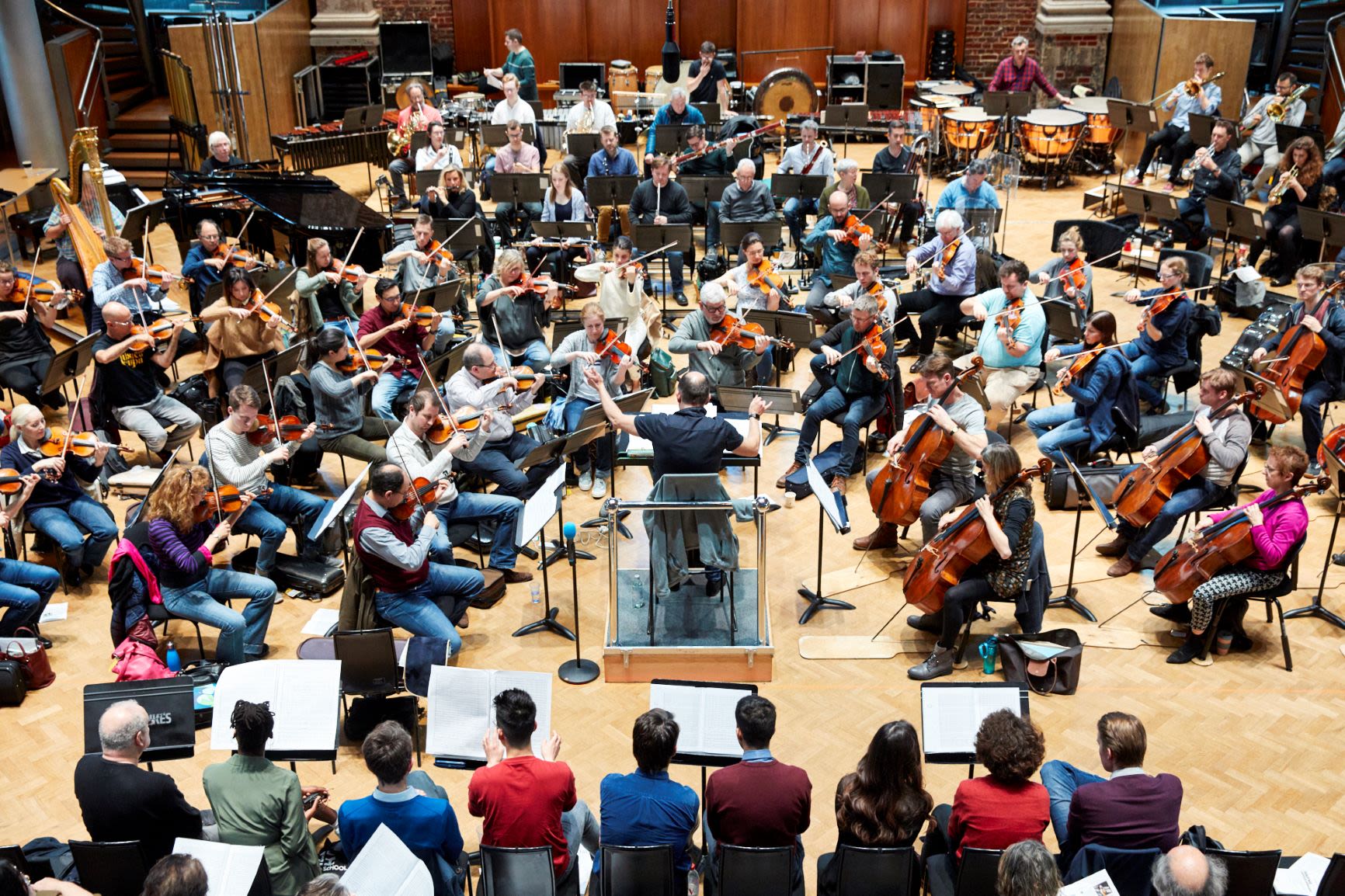
Applications for the 2022/23 LSO Panufnik Composers Scheme are now open, and close on Monday 10 January 4pm GMT.
The Scheme: Where did it all start?
Some fifteen years ago, the Orchestra in association with Lady Panufnik devised a scheme to support composers interested in writing for a full symphony orchestra, in memory of the late composer Sir Andrzej Panufnik.
'My composer husband received three commissions and recorded most of his symphonic music with the LSO. He worried about how young composers could nowadays attain essential experience with highest level orchestras: this project fulfils his dream.'
Lady Camilla Panufnik
Three composers took part in a pilot year in 2005. Each year since then, six emerging composers have received support and mentoring from composer Colin Matthews through the scheme to develop their orchestral writing skills.
The LSO Panufnik Composers Scheme has been generously supported by Lady Hamlyn and The Helen Hamlyn Trust since its inception.

Sir Andrzej Panufnik
1914–91
Sir Andrzej Panufnik was one of the most important and original symphonic composers of the second half of the 20th century.
In Nazi-occupied Poland, with public concerts banned, he arranged a massive amount of classical music for two pianos which he played as a duo in 'artistic cafés'. At great personal risk he conducted illegal concerts and composed patriotic resistance songs.
In 1945, the 31-year-old Panufnik, eager to help the revival of classical music post-war, was appointed Chief Conductor of the Kraków Philharmonic Orchestra. In 1946, he was similarly asked to restore the Warsaw Philharmonic to life.
After 1948, with the imposition of Soviet Socialist Realism, Panufnik’s situation changed dramatically. As Poland’s leading composer, greatly respected throughout Europe, he was under much more intense pressure than his compatriots, bullied to write according to the Soviet imposition of Socialist Realism.
In 1954, he made a dramatic escape from Poland as a protest against Communist control over creative artists, and this resulted in a raft of vicious propaganda and lies put out about him, followed by total censorship of his name and his music in Poland for 23 years.
From 1957 to 1959, he served as Chief Conductor of the City of Birmingham Symphony Orchestra, his last official position before deciding to dedicate his life entirely to composition.
By the 1970s, Panufnik was very much part of British musical life and his music was performed by most of Britain’s leading orchestras, with performances at the BBC Proms and at many LSO concerts.

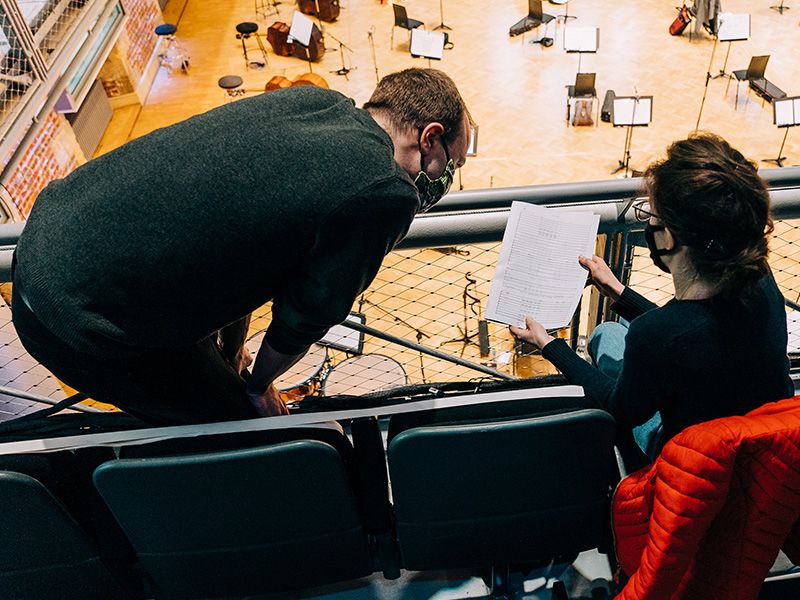
2021 workshop © Matt Jolly
2021 workshop © Matt Jolly
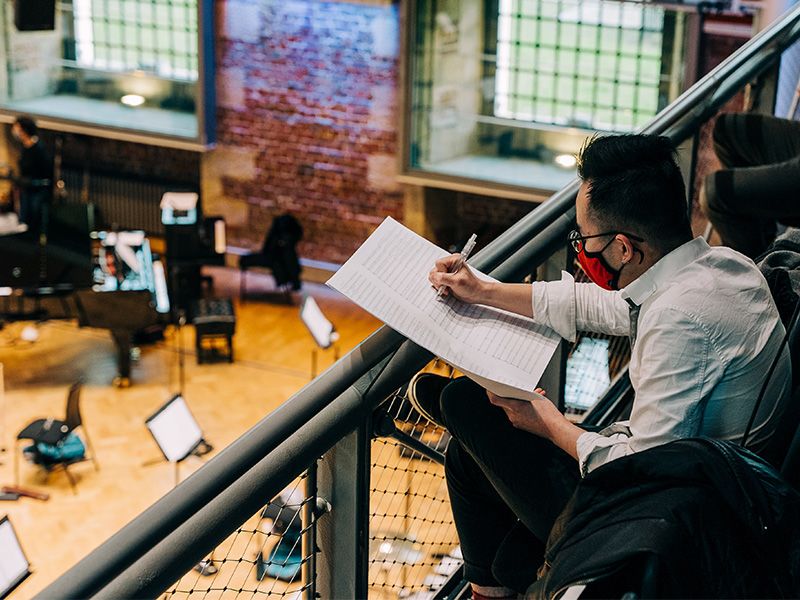
2021 workshop © Matt Jolly
2021 workshop © Matt Jolly
How does the scheme work?
Over the course of twelve months, each composer creates a three-minute composition for the full Orchestra, guided by renowned composers Colin Matthews , and with support from Christian Mason (himself a participant in the 2006 LSO Panufnik Composers Scheme) and Errollyn Wallen.
Reality Days
The scheme begins with a two-day induction called 'Reality Days' at LSO St Luke's. The new composers meet together with Colin, Christian and Errollyn, introduce their music to the group, and learn in detail what they can expect from their time on the scheme. They also get to grips with writing for an orchestra by workshopping their first sketches with an LSO musician.

2021 workshop © Matt Jolly
Development Phase
Composers begin the process of developing their three-minute piece. Over a number of months, they benefit from:
- 1:1 and group mentoring sessions with Colin, Christian, Errollyn and the other composers on the scheme
- Workshops with LSO musicians, where composers can learn about individual instruments and experiment with ideas
- Access to LSO rehearsals and concerts, allowing composers to get to know the Orchestra as a whole up close
- Tailored support from an extra tutor for those with less experience writing for an orchestra

2021 workshop © Matt Jolly
Generating Parts
The LSO copyist works with composers to generate scores and parts for the Orchestra.
'This scheme is about experimentation and it's the opportunity to do absolutely whatever they want to do. It's very exciting to watch the development.'
Colin Matthews, Composition Director

Panufnik Composers Workshop
One year after they began writing, the composers experience a pivotal point in the writing process as they gather together at LSO St Luke's to hear their pieces performed in full for the very first time.
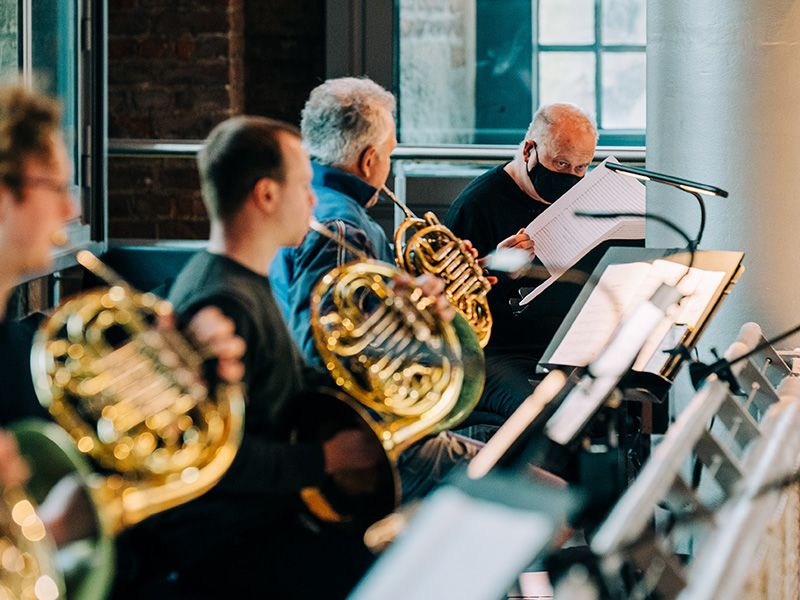
2021 workshop © Matt Jolly
LSO Principal Guest Conductor François-Xavier Roth , who has been involved with the scheme since the very beginning, conducts the workshop. The day is split into two sessions, both open to the public, focusing on three composers' works in the morning and three in the afternoon.
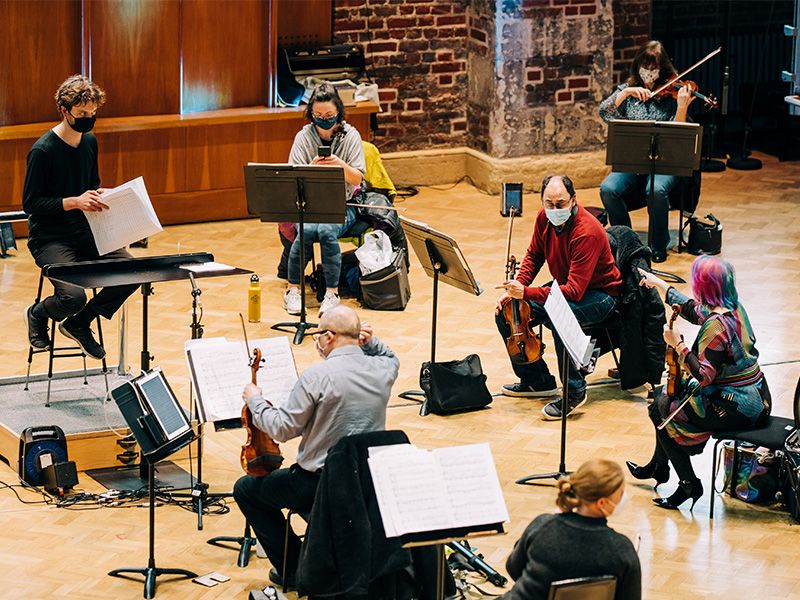
2021 workshop © Matt Jolly
More than just a performance, these workshops are a chance for everyone involved in the process, including Colin Matthews, Christian Mason, Errollyn Wallen and LSO musicians, to openly discuss the pieces and offer even more tips and guidance.

2021 workshop © Matt Jolly
2021 workshop © Matt Jolly

2021 workshop © Matt Jolly
2021 workshop © Matt Jolly
'The Panufnik Composers Scheme is something I'm very proud of. It's young composers having the opportunity to be performed by the LSO in a workshop day. We play their music, we rehearse, we advise. It's something so amazing.'
François-Xavier Roth, LSO Principal Guest Conductor

What comes next?
Each year after the public workshop, two composers are selected to develop their works further. They are commissioned to write either a 5- or 10-minute piece. These complete pieces are then premiered in one of the Orchestra's main season concerts at the Barbican.
And it doesn't end there …
Composers who pass through the LSO Panufnik Composers Scheme become part of the LSO family, sometimes receiving additional commissions for our educational projects, or for full orchestral concerts.
'A real relationship develops, which continues beyond the scheme itself, so that we feel that a 'Panufnik family' has been established.'
Colin Matthews
- The 2019/20 season opened with the world premiere of Emily Howard's (2007 scheme) Antisphere, commissioned for Sir Simon Rattle and the LSO by the Barbican.
- In Autumn 2020, Ayanna-Witter Johnson (2008 scheme) was commissioned to write a piece with and for young musicians on the LSO's East London Academy, which they and LSO musicians recorded during lockdown.

Sir Simon Rattle and Emily Howard, 2019/20 season opening concert © Mark Allan
Sir Simon Rattle and Emily Howard, 2019/20 season opening concert © Mark Allan

Young musicians from the LSO East London Academy working on DreamCity, composed with and for them by Ayanna Witter-Johnson
Young musicians from the LSO East London Academy working on DreamCity, composed with and for them by Ayanna Witter-Johnson

Jonathan Woolgar
LSO Panufnik composer 2019
In December 2018, Jonathan Woolgar was announced one of 2019's six Panufnik composers. Here he tells us all about his own experience writing for a full symphony orchestra.
'The make-up of the orchestra is loaded with musical-historical subtext. That the orchestra is what it is, sits how it sits, wears what it wears, and plays how it plays, is not to be taken for granted. It is the living embodiment of a particular tradition.
Therefore, one question I asked myself when writing a three-minute piece for the LSO was when to go with the grain of that tradition and when to go against it. The essential make-up of an orchestra creates certain sonic hierarchies and acoustical facts which inform how a composer can make that orchestra sound good, to make it balance and really ring. But there is also the matter of performance tradition and repertoire. There is music that sits snugly and deeply in the DNA of an orchestra, which defines the traditions of orchestral music – one might think of Beethoven or Tchaikovsky. One of my favourite sounds in the world is an orchestra, especially one like the LSO, playing Wagner, Mahler or Strauss. I want to engage with that soundworld in my own orchestral writing because I love it so deeply; many orchestral players and listeners love it too.
But like any composer, I want to bring something new to the table, to give listeners something that they haven’t heard before – or at least something that they have heard before but expressed in a new way.
I sought to make the Orchestra sound gloriously like itself, to create a piece that relates to the traditions of what an orchestra is and which the musicians can sink their teeth into. But I tried to do this in unexpected and even disorientating ways. The title, PROTO-SYMPHONY, reflects this. The loaded tradition of the symphony is pressure-packed into a tiny space; familiar sounds and gestures are compressed or combined or reordered, the earnestness of an Austro-German symphony meets the hairpin turns of a funfair ride. I have, I hope, met the Orchestra on its own ground, while also giving the musicians and listeners something new to chew on.'
PROTO-SYMPHONY was workshopped by the LSO in March 2021. Hear the piece and find out more about the LSO Panufnik Composers Scheme. Click here to find out more.
Listen: The Panufnik Legacies
The Panufnik Legacies series of albums on LSO Live showcases new music by some of the most exciting young composers working in the UK today. All of the composers featured on the recordings are alumni of the LSO Panufnik Composers Scheme.
The first album of works by selected composers from across the first five years of the LSO Panufnik Composers Scheme was released in 2010. Another album followed in 2015, and a third was released last year.
'Each composer here represented is imaginative and confident, and of course they benefit hugely from the Panufnik Scheme, having the LSO on scintillating form, and from the dedicated conducting of François-Xavier Roth. This release is enthusiastically recommended for the music, the performances and for the outstanding quality of the recorded sound.’
Classical Source on Panufnik Legacies II (2015)
Joe Bates
LSO Panufnik composer 2019
Joe Bates was also announced as one of 2019's six Panufnik composers in December 2018. He told us about the significance of writing his three-minute orchestral piece.
Muted The Night marks a major step forward in my musical ideas and marks moments of enormous change in my personal life.
The title is taken from a gorgeous poem by Wallace Stevens, Peter Quince At The Clavier. Its fundamental message is that 'music is feeling, then, not sound' – a romantic understanding of music-making that I find very seductive. A hand-printed copy of the poem hangs above my piano. It somehow fused in my mind with a piece that obsessed me, Cassandra Miller’s wonderful Duet for Cello and Orchestra.
At first, I used quartertones as a source of music disorientation. Years of playing had shaped my hands, allowing them to find customary chords and melodies with ease. Retuning my keyboard shook up my familiar patterns and helped me find new ideas.
To write this work, I decided to ditch the disorientation and gain a better understanding of my quartertone system. I developed a tonal system, a quartertone analogue to the usual major and minor keys. I then divided the orchestra into two groups; each group uses three different quartertone pitches. These pitches give them access to two keys each, for a total of four key areas.
This restriction came with two benefits. For players, quartertones can be challenging. Limiting the total number thus eases performance. For me, the clear key system allowed me to use some familiar bits of musical rhetoric – the arpeggio, the perfect cadence – in unfamiliar and exciting ways.
I also devised a fun way to explore this system. I usually plot my quartertone works using my voice and a retuned digital keyboard. For this piece, I began with a retuned autoharp. The autoharp is a folk instrument, like a zither with keys. The keys allow it to move through a set of conventional chords and keys. When retuned into my zany system, it plays conventional chords within an unconventional system. This was the source of a lot of my initial ideas.
Halfway through writing this piece, I was hit by a car. I spent two weeks in the hospital, with a shattered kneecap and a fractured vertebra in my neck amongst my worst injuries. A great deal of this piece was written in the weeks afterwards. I was recovering at my parents’ home, gradually getting up onto crutches. I would spend most of my days propped up in bed, writing this piece.
It was, to be frank, a bleak time. My friends and family were wonderful, but I found the sudden confinement and not-inconsiderable pain difficult. By this point, much the piece’s tone had been established, so I’m not sure if you can hear any relics of the accident in it. But to me, Muted The Night will always be associated with the strangeness of that period: writing brass fanfares and beating out cross-rhythms in between endless games of online chess and dully painful physio routines. Perhaps these emotions surface from time-to-time, in the slightly-numb ending, or the fidgety timpani rhythms that underpin most of the piece’s second half.'
Muted the Night was workshopped by the LSO in March 2021. Hear the piece and find out more about the LSO Panufnik Composers Scheme. Click here to find out more.

